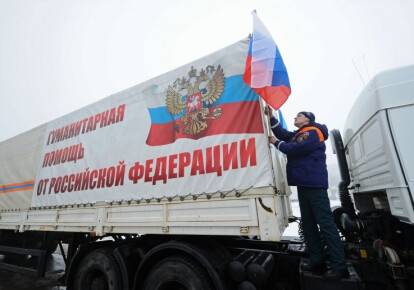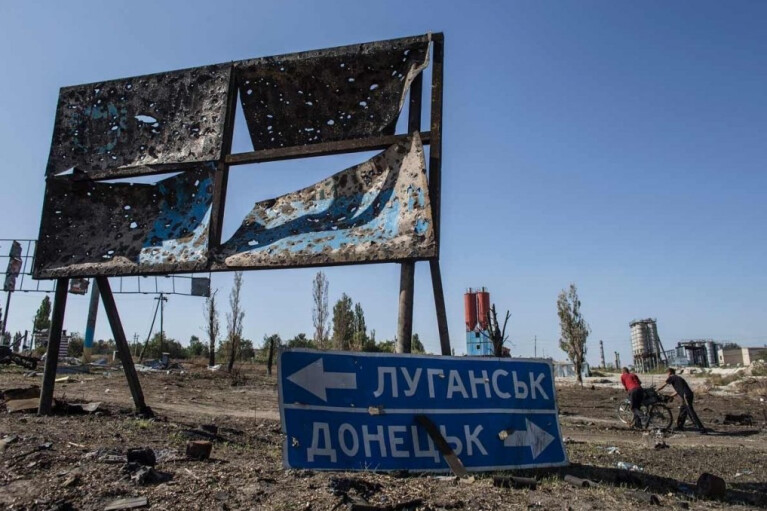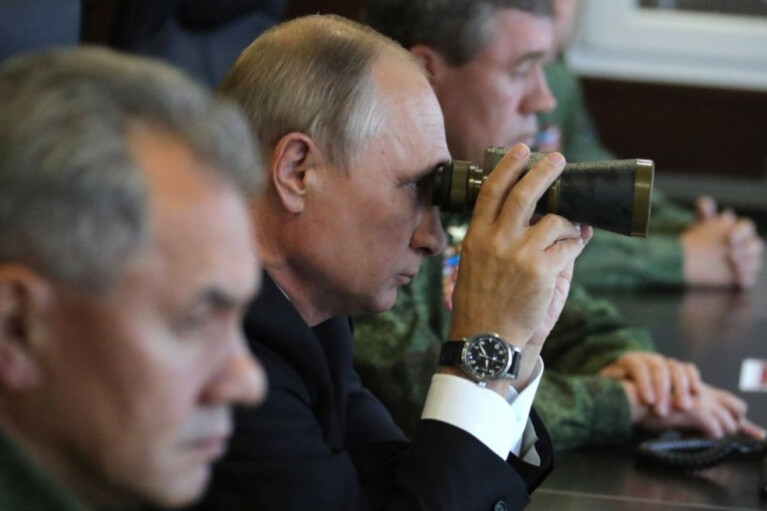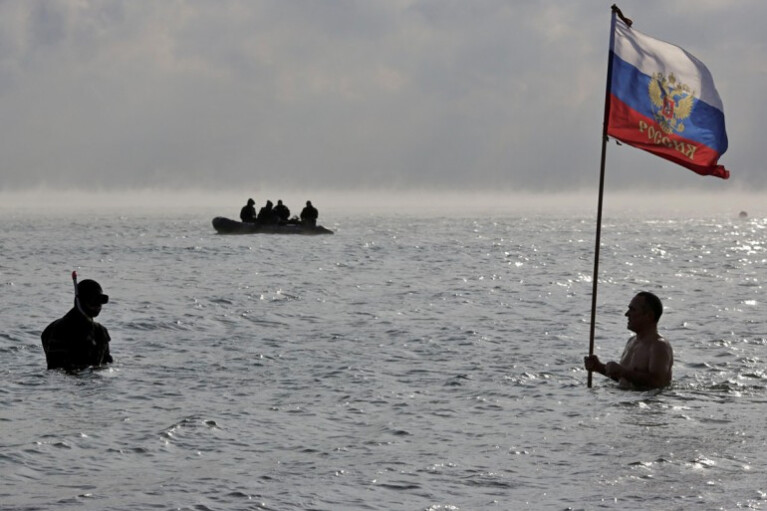Servitude and other troubles. A kind of peacekeeping Russia is playing

Who needs a "frozen" status
The problem of freezing the conflict on the south-eastern border of Ukraine comes back to the headlines of media and political discussions again. Most likely, it happens for two reasons.
The first reason is the need to fill in the mandates of the responsible persons and intermediaries with some real content: the negotiations had been held for a long time, and it was not even clear who would participate in them from the Russian side. However, it seems that Vladislav Surkov manages to retain his position - perhaps he will lose some of his other functions, but not this one.
The second reason is the dangerous position of Russia's state finances, which turned out to be closely connected with a quarter of a trillion dollars of debts of the state-owned enterprises in the conditions of cutback of refinancing opportunities. Up to a third of Russia's foreign exchange earnings is used to pay their debts. A sort of instant collapse of the Russian economy, though it would amuse the ego of some global players, carries the risks of a sudden chaotic destabilization of the situation in Eurasia, to which no one is ready (with the possible exception of Democratic Peopleís Republic of Korea).
Under these conditions, Russia hopes that it is still possible to persuade a number of EU member states to see that they (Russia) start to push Ukraine towards compromises with the help of the stick of the hybrid war and the carrot of the Russian various resources. The promise for peace-loving Europeans will be Russia's readiness for the "peacekeeping mission", and one must understand, that the illegal armed formations will not be dissolved but be turned into a kind of "militia". But not only that. These compromises in the eyes of Russia - according to rehabilitated State Duma deputy Konstantin Zatulin (thanks to his efforts in Crimea's annexation) the mean the federalization of Ukraine in line with Bosnian pattern. That will not allow Ukraine to become a member of NATO and the EU and will create a permanent springboard for Russia's participation in domestic Ukrainian politics. In fact, this line remains unchanged. But current Russian regime will keep pushing as much as power and money will let them do so; they can change only the carrots and the sticks.
However, it is clear that the Kremlin does not rely on the West too much due to the fact that it cannot force the overwhelming majority of Ukrainian society and the comparative majority of the Ukrainian political class to take such suicidal steps.
Therefore, the upcoming election campaign in Ukraine is another reason for the return of the peacekeeping theme and the embodiment of the notorious Minsk agreements. The transfer of a number of popular TV channels to the chief agent of the Russian influence in Ukraine, a relative of the Russian dictator Viktor Medvedchuk, under conditions when most of the influential media are already in the hands of political opponents of the current government, is a claim for zombieing some of the voters with the help of demagoguery of "peace" and "social justice". After all, foreign policy maneuvers are helpless without the appearance of a real interlocutor within Ukrainian politics; the current marginalized variegated reactionary league has no serious influence or authority.
Artificial "alternatives"
It is unlikely that in the near future we will hear fresh proposals from the Russian Federation, except Moscow's reaction to its "consent" to the introduction of a peacekeeping mission in some sly format. Especially those proposals that could be acceptable for Ukraine if it retains patriotic power.
Russia, on the one hand, counts on Europe's fatigue from the Ukrainian theme, its immersion in its own problems, on the interest of certain EU countries in access to relatively cheap energy sources (which Moscow can supply at a below market price for a while).
On the other hand, the Russian Federation (RF) will try to aggravate the situation for a while and where it only can, in particular, on the Sea of Azov. The RF will also try to influence the public opinion of Western countries with misinformation operations and threats of terror disguised as "Islamist", or in some other way.
Despite the difficult economic situation, the slide down into internal destabilization, the Syrian impasse, a full-scale cold war with the West, one should not indulge in illusions that Putin's regime will easily surrender its gains. Ukraine, for its part, has nothing to give up ground anymore - all concessions have already been made in 2014, and the idea of "creating a kind of Finland" has become obsolete long ago.
Servitude topic of the "disputed" territories looks amusing at the present time (in other words it's a topic of double subordination). It seemed that this idea, which had become once the schtick of Inna Bogoslovskaya election campaign about Sevastopol, after the seizure and annexation of the Crimea had to go forever into oblivion. But it is alive again in media space; and now it relates to the territories of Donbass. Although, it is quite obvious: such an initiative meets the interests of the Kremlin only. The Kremlin has said already that it is not ready either to recognize the independence of the People's Republic of Donbass and the People's Republic of Luhansk, or to include them in the Russian Federation, but at the same time Russia seeks to retain control over them and give them a legally registered status.
With regard to Ukraine, the throwing in the topic of the dual subordination of the occupied territories or some other options of their fate, apart from the withdrawal of the Russian hybrid forces and the return of legitimate power to these areas, is nothing more than a distraction of attention of Western partners of Ukraine by artificial "alternatives".
It is quite obvious that there can be no peace with Putin's Russia and Ukraine as well as with other Russian aggressive imperialistic government and any key Western countries. Even being a half outcast, the Russian Federation does not fit into the Minsk, or in the Norman, or in any other civilized format of negotiations and relations for internal reasons only.
Fantastic Peacemaking
At the same time, clearly European attempts to present the Russian-Ukrainian war in Donbas as a "frozen conflict" today are not only unconvincing, but even double-edged. These exercises look unconvincing due to a fact that people shoot every day on the Russian-Ukrainian front and there is subversive war there. This situation does not remind Transnistria or even Karabakh, where some aggravations happen from time to time.
The situation in Donbass can be compared to Israeli-Palestinian conflict, in which the changing coalition of Muslim states participates on the part of Palestine. And the "Russian world" itself resembles a grotesque analog of the "Ummah", united only by language and religion.
Minsk peace process often recalls the process of the Middle East peace settlement, for "promotion" of which the Nobel Prizes have already been granted. However, the status of the "frozen conflict", that is so dear to the heart of some international organizations and foreign policy bureaucracy of a number of influential states, carries a lot of risks for them as well.
We can recall what Kosovo was in Europe for many years, and recall that Palestine was the main recruiting base of terrorists before the infusion into the community of armed fundamentalism of the Syrians, Iraqis and countries of post-Soviet Central Asia. Already today the region starts to feel the appearance of the clandestine counterfeit industry and the proliferation of conventional weapons in Donetsk and Luhansk territories.
The frostbite of Donetsk and Luhansk conflict in this case presupposes the broadest mandate of the mission with the participation of tens of thousands of servicemen and technicians, and, definitely, it will not be Ukraine who will pay these costs for many years (without much progress).
At the same time, it is impossible to overestimate the level of Moscow's control over Donetsk and Luhansk gangs, which means that international peacekeepers, with a mandate or a rifle, will have to fight with that pretty big number of the terrorists that Russia cannot or doesn't want to utilize.
Therefore, for the time being the peacekeeping project looks like a frank fantasy, even if we take away from the brackets the absence of a clearly expressed desire of the Russian Federation to fulfill the Minsk agreements by the only possible way, namely the transparent demilitarization of the occupied territory. It seems that at least until the end of the presidential and parliamentary elections in 2019, the Kremlin will have enough money, personnel and desire to continue to keep the current status of Donetsk and Luhansk territories. Moreover, there are attempts to aggravate the conflict with Ukraine and the West by the evocative announcement of "elections" in these territories in November. But at the same time Moscow will need to demonstrate some movement towards peace. The question is: What new can Russia offer?
More good and different formats
There can be many different formats in the end. As it is known now, Rand Paul, a courier from Donald Trump in the rank of Senator, visits Vladimir Putin often. Veterans of intelligence and presidential lawyers meet somewhere along the European back streets. From time to time, the yachts of Putin or members of his closest circle appear in the Mediterranean ports side by side with the yachts of French billionaires or Italian politicians.
At the same time, the White House has an influential "underground" that conducts its foreign policy in a certain union - for example, with Pentagon. As it turned out during the preparation of the ruling party in Poland for local elections and for voting in the European Parliament in favor of imposing restrictions on Hungary even Poland and Hungary now have different positions on the European question. It seems that the most important thing from the point of view of Ukraine's interests is to conduct more such negotiations, and without any focus on their specific result, just to take at word both Russians and their own allies. This is what Kyiv is still doing today with some dexterity.
Of course, the West has fairly tough instruments of pressure on Ukraine (although at the moment it is difficult to perceive it as one organic whole, despite declarations of varying degrees of depth and significance).
In general talking about instruments we can name external debts, energy, the tone of the global media, creating a specific atmosphere for making certain decisions in international litigation between Ukraine and Russia as well as one or another intelligence information about domestic Ukrainian affairs, important as much as Ukraine is a competitive democracy (for example, such compromising evidence could work very hard in a wild Russia (it was much more progressive state even in the second half of 2000s,) as it would unite attack objects around the ruler).
But this abstract collective West has not less, but rather a large arsenal of pressure on Russia, and has not yet used a quarter of this potential, due to not too correct planning and forecasting. After all, not so long ago, Russia was perceived as a cultural co-equal. The understanding that this is false, appeared only after the barbaric chemical attacks of the Kremlin in Syria and Britain.
Therefore, in a dialogue with the West regarding the peace process and response to the Russian maneuvers, Ukraine can feel more free gradually embodying and using an alternative "salami plan" for de-occupation of Donbass (especially since Russia does not officially recognize itself as a party to the conflict). With all respect to the humanism of the Europeans, the constant implementation of this alternative plan can motivate our European partners to expand the instruments of Russia's persuasion more vigorously and to force it to implement Minsk agreements.
After all, the sooner Russia will close its Minsk commitments (though it has not started yet), the more quickly the "salami tactics" will be replaced with the regular functioning of the Ukrainian local and central authorities in the territories affected by the Russian intervention. As such, the more peace in hearts of our and Russian European partners will be and the cleaner will be their conscience, as much as it is possible to use this criterion in terms of foreign policy.
Read more:



